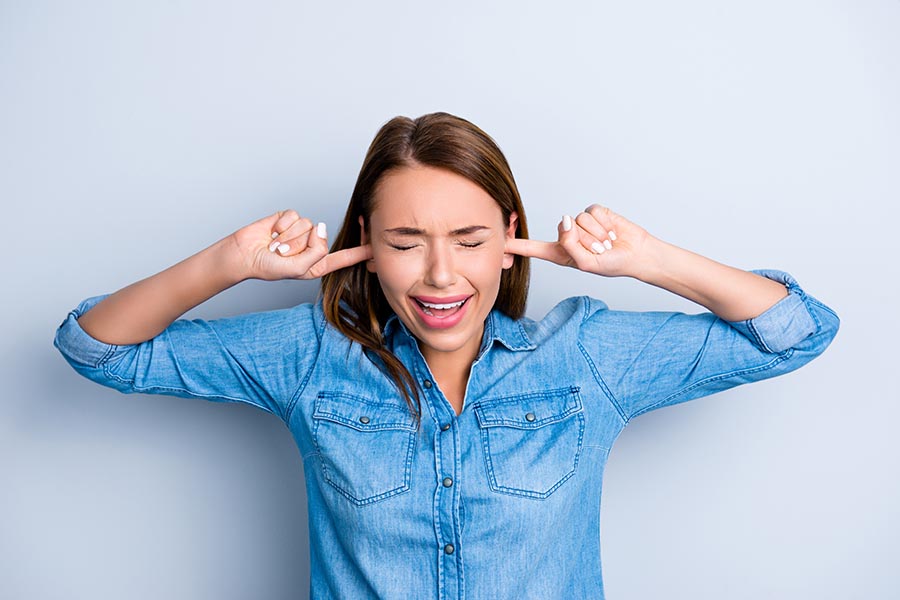Misophonia is a kind of disorder in which certain sounds start to trigger psychological or physiological responses that people might assume as unreasonable given the circumstances. Here, people tend to produce abnormally strong and negative reactions towards ordinary sounds that humans usually make, like the sounds that happen while chewing or during normal breathing. Misophonic people might call it a sound that “drives you mad.” Their reactions to this sound can range from anger to panic and the need to flee.
Patients suffering from misophonia are quite affected emotionally by the sounds that other people make, and usually one’s that other people don’t pay heed to, like in case of yawning or chewing that cause a fight-or-flight response that triggers the anger and a strong desire to escape that vulnerable situation. The disorder is also referred to as selective sound sensitivity syndrome.
Origin

The term “Misophonia” has been derived from the ancient Greek word that stands for “hatred of sound.” It has both psychological and physiological symptoms. Recent studies showed in the MRI scans that feature a striking difference in the brain structure of those who have misophonia and how their brains react when hearing the trigger sounds.
Symptoms Of Misophonia

The strength of the reaction and the response of an individual to the condition varies a lot. Some people might experience annoyance and irritation, while others can fly into a full-blown rage. Both men and women can develop this condition at any age, although people typically start showing more signs and symptoms in their late childhood or early teenage years. People with misophonia realize that their reactions to the sounds are excessive, and the intensity of their emotions can make them think they are losing their control gradually.
Researchers have identified some responses as the symptoms of misophonia:
- disgust turning into anger
- becoming verbally and physically aggressive to the person making the noise
- irritation turning to anger
- physically lashing out at those making the noise
- taking action around people making trigger sounds
People with this kind of sound sensitivity start to mimic the noises that trigger their aggressive reactions. Generally, they may have more symptoms of anxiety, depression than others. In addition to the emotional responses, it has been found that individuals with misophonia commonly experience several physical reactions, including:
- more rapid heartbeat
- increases in body temperature
- pressure throughout the body, especially the chest
- muscle tightness
Studies have shown that around 52.4 percent of its participants with misophonia could also be diagnosed with a disorder named obsessive-compulsive personality disorder. Misophonia includes some negative physical reactions to particular noises like anxiety, aggression, panic, irritation, or severe stress.
Phonophobia is also a different condition and refers to a fear of specific sounds. For most people, sounds of eating, yawning, breathing creates issue to those misophonic. People with misophonia often react angrily or become stressed when in proximity to these sounds. They may feel an urgent need to flee from the area.
Misophonia Triggers

Researchers in Amsterdam Trusted Source identified the following as the most common triggers:
- Eating sounds, affecting around 81 percent of the examined people
- Noisy or loud breathing, affecting 64 percent
- Finger or hand sounds, affecting about 59.5 percent
Many samples had an angry and aggressive response towards the sight of someone creating certain physical action created noises. People here cause most of the sounds and sights that trigger misophonia. A pet slurping down a bowl of food or similar does not usually initiate a misophonic reaction.
The most common triggers that come from other people’s mouths are:
- swallowing
- throat clearing
- slurping
- lip-smacking
Other triggers depend:
- papers rustling
- ticking clocks
- sniffling
- car doors slamming
- writing sounds
- the sounds of birds
Almost any sound can be a potential trigger. Some with misophonia also have visual triggers, which include:
- nose rubbing
- hair twirling
- foot wagging
In certain cases, there appears to be a higher occurrence of the disorder among people who also have the following conditions:
- obsessive-compulsive disorder (OCD)
- anxiety disorders
- Tourette syndrome
- Tinnitus
Tinnitus is a type of disorder in which you hear sounds, like a ringing in your ears constantly, that no one else can hear it.
Misophonia can be even worse and can lead to complete isolation of that person, as people suffering from this type of condition try to avoid these trigger sounds. People who have misophonia feel confused or embarrassed and don’t mention it to healthcare providers for asking for support. It is a disorder that seriously compromises functioning, socializing, and ultimately your mental health.
Read Also: What Is Autophagy?







